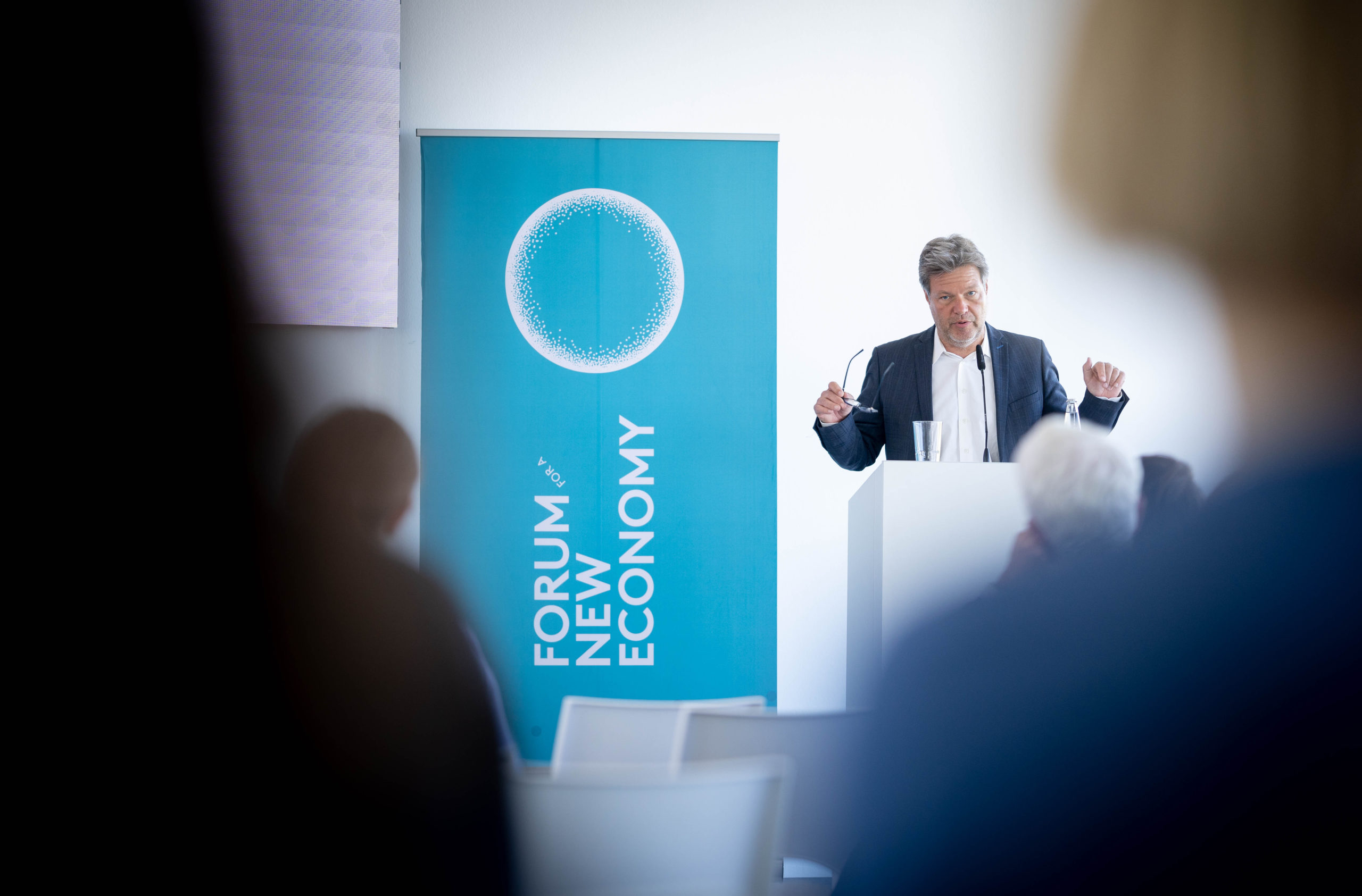NEW PARADIGM
Robert Habeck on the Transformation of the German Economy
How can we transform the German Economy after Corona and the energy crisis to meet the challenges ahead? Robert Habeck, Mariana Mazzucato and Philip Steinberg gave some insights at our XII New Paradigm Workshop.
BY
SONJA HENNENPUBLISHED
11. MAY 2023READING TIME
5 MIN
As part of our XII New Paradigm Workshop we invited Vice Chancelor And Federal Minister for Economic Affairs And Climate Action Robert Habeck as well as leading economist Mariana Mazzucato to give keynotes on the question of how to transform the German economy amidst and after the ongoing overlapping polycrises.
In his address, Robert Habeck reminded the audience of the difficult nature of maneuvering the present situation in a highly industrialized country like Germany. Since taking office, economic policy making has been dominated by continuous crises – first the Covid pandemic, then Russian war against Ukraine and subsequent energy crisis, all the while the global climate crisis continues to overshadow everything.
Importantly, Habeck added, all of these crises are also nestled into broader geopolitical shifts.
“Today, climate and industrial policy must be seen also as security policy. This makes the transformation of the German economic model all the more important.”
While Germany in the space of a few months weaned itself off of Russian coal, oil and gas, and yet managed to dodge a recession, Habeck remained clear that as a model built on the availability of cheap energy, the status quo of the German economy cannot continue. As crucial elements for the transformation, Habeck named the commitment to a green social market model, the modernization of the German energy supply and industrial value creation.
“We should think of climate neutral and affordable energy supply and transformative industrial policy as a DNA double helix – the two strands are deeply intertwined. We cannot just sit back and watch as our partners are investing in the transition.”
The goal of the government is to massively expand renewables to provide the German industry with cheap energy, to ramp up the hydrogen industry and replace conventional power stations. The ministry estimates that Germany will be able to produce 30 percent of its green hydrogen domestically, the rest will have to be imported from a diversified pool of suppliers.
Habeck also argued that Germany should focus on modern supply side policies. Rather than repeating the deregulation policies of the 1980s, the goal should be to address shortages such as skilled labor, capital and technology, and reduce bureaucracy. He added that the transformation will only succeed if it is socially compatible, and people receive equal opportunities from day one, rather than relying on the trickle-down myth.
In her subsequent keynote, leading economist and director of the Institute for Innovation and Public Purpose, Mariana Mazzucato made an appeal to move away from the public versus private sector dichotomy, and instead focus on how this relationship could be transformed into a symbiosis capable of addressing the important present-day challenges. This process requires going beyond the abstract and focusing on lessons that can be learned from the ground.
As an example, Mazzucato named the NASA space mission, that set very clear standards in terms of outcome rather than cost-oriented procurement, and successful private-public partnerships. Rather than reducing its activities to fixing market failures and incentivizing private actor engagement, NASA redesigned its contracts to ex-ante embed the idea of collective intelligence and governance. This prevented the outsourcing of crucial activities and enabled continuous learning and capacity building on both the private and public side.
Where in past transformations risks were socialized and rewards privatized, moving forward both risks and rewards should be collectively shared.
In the last part of the session, Philipp Steinberg and Mariana Mazzucato spoke about the extent to which such transformative and mission-oriented supply-side policies are already being implemented by the German government.
Steinberg reiterated the commitment to a transformative supply-side economy that brings together the supply and demand sides, but cautioned against too high expectations given the complexity of the transformation and the challenges. While the current crises would accelerate the green transformation of the economy in the medium and long term, supply-side factors such as labor shortages and lack of productive capacity are important inhibitors, he said. While building and strengthening alliances between public and private actors is important, the first priority is to urgently qualify sufficient manpower to carry out the concrete steps of transformation, he said. He added that it was also essential to become more agile and not be inhibited by the paradigm of economic efficiency.
The session was moderated by the head of the OECD Berlin centre Nicola Brandt.
